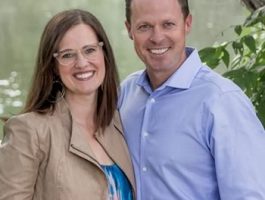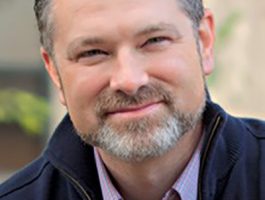
The Impact of a Good Man: David & Meg Robbins
As a man, what are your weaknesses? True manhood goes beyond the physical, embracing family responsibilities like providing with security, nurturing and service, and maybe even the thrill of fantasy football drafting. Dave & Meg Robbins teach us what it means to be a good man.
Show Notes
About the Host
About the Guest
-
- Want to hear more episodes by David and Meg Robbins, listen here!
- Double your impact by Dec 31! Give families the gift of togetherness—donate, and it's matched dollar for dollar. Act now for lasting change.
- Find resources from this podcast at shop.familylife.com.
- See resources from our past podcasts.
- Find more content and resources on the FamilyLife's app!
- Help others find FamilyLife. Leave a review on Apple Podcast or Spotify.
- Check out all the FamilyLife's podcasts on the FamilyLife Podcast Network
-
Dave and Ann Wilson
Dave and Ann Wilson are hosts of FamilyLife Today®, FamilyLife’s nationally-syndicated radio program. Dave and Ann have been married for more than 38 years and have spent the last 33 teaching and mentoring couples and parents across the country. They have been featured speakers at FamilyLife’s Weekend to Remember® marriage getaway since 1993 and have also hosted their own marriage conferences across the country. Cofounders of Kensington Church—a national, multicampus church that hosts more than 14,000 visitors every weekend—the Wilsons are the creative force behind DVD teaching series Rock Your Marriage and The Survival Guide To Parenting, as well as authors of the recently released book Vertical Marriage (Zondervan, 2019). Dave is a graduate of the International School of Theology, where he received a Master of Divinity degree. A Ball State University Hall of Fame quarterback, Dave served the Detroit Lions as chaplain for 33 years. Ann attended the University of Kentucky. She has been active alongside Dave in ministry as a speaker, writer, small-group leader, and mentor to countless wives of professional athletes. The Wilsons live in the Detroit area. They have three grown sons, CJ, Austin, and Cody, three daughters-in-law, and a growing number of grandchildren.
-

Brant Hansen
Brant Hansen uses his media platforms to advocate for the healing work of CURE, a global network of surgical hospitals for children with disabilities in developing nations. He’s a syndicated radio host and the author of Unoffendable, Blessed Are the Misfits, and The Truth about Us. In addition to speaking on the subject of The Men We Need, he frequently speaks at churches, conferences, and corporations on the topics of forgiveness, faith and the autism spectrum, and the kingdom of God. Bran...more
David and Meg Robbins
As 17-year veterans of Cru, David and Meg Robbins have served in a variety of capacities, beginning as field staff at their Alma Mater, the University of Mississippi. In 2003, they moved to Pisa, Italy, to serve as overseas team leaders for Cru. It was during that time they fell in love with finding ways to relate and communicate with a secular, pluralistic culture. They trained to serve overseas long-term until God surprisingly led them back to the U.S.
Kelly Kapic
Kelly M. Kapic (PhD, King's College, University of London) is a professor of theological studies at Covenant College in Lookout Mountain, Georgia, where he has taught for twenty years. He is an award-winning author of more than fifteen books, including Embodied Hope: A Theological Meditation on Pain and Suffering, winner of a Christianity Today Book Award. Kapic, a popular speaker, has been featured in Christianity Today and The Gospel Coalition, has worked on research teams funded by the John T...more
Nancy Pearcey
Nancy R. Pearcey is a bestselling author and speaker. A former agnostic, she was hailed in The Economist as "America's pre-eminent evangelical Protestant female intellectual." Her work has appeared in the Washington Post, Washington Times, First Things, Human Events, American Thinker, Daily Caller, The Federalist, CNSNews, and Fox News. She has appeared on NPR, C-SPAN, and Fox & Friends. She is currently a professor and scholar in residence at Houston Christian University. Pearc...more
Paul Miller
Paul E. Miller (MDiv, Biblical Seminary) is executive director of seeJesus, a global discipling mission, and best-selling author of books and interactive Bible studies including A Praying Life and J-Curve. He and his wife, Jill, live in the Philadelphia area and have six children and a growing number of grandchildren. Follow @_PaulEMiller on Twitter, listen to the Seeing Jesus with Paul Miller podcast, or learn more at seeJesus.net.
Shelby Abbott
Shelby Abbott is an author, campus minister, and conference speaker on staff with the ministry of Cru. His passion for university students has led him to speak at college campuses all over the United States. Abbott is the author of Jacked and I Am a Tool (To Help with Your Dating Life), Pressure Points: A Guide to Navigating Student Stress and DoubtLess: Because Faith is Hard. He and his wife, Rachael, have two daughters and live in Downingtown, Pennsylvani...more
Explore true manhood: beyond the physical, embrace family roles like security, nurturing, service, and even the thrill of fantasy football drafting.
The Impact of a Good Man: David & Meg Robbins
Shelby: Welcome to FamilyLife Today. And welcome! [Laughter] How do you feel when I say that?
Ann: It’s a special day.
Shelby: It is a special day.
Dave: We sort of feel welcomed. [Laughter]
Shelby: Good. [Laughter] I said it like four times! What do you want from me, like a new car or something like that?
Dave: Yes, that would be nice.
Shelby: Too bad.
Shelby: Welcome to FamilyLife Today, where we want to help you pursue the relationships that matter most. I’m Shelby Abbott, and your hosts are Dave and Ann Wilson. You can find us at FamilyLifeToday.com.
Ann: This is FamilyLife Today.
Shelby: So, Dave and Ann Wilson are here and special guests, David and Meg Robbins. Welcome to you!
David: Thanks for my new car! [Laughter] That’s amazing!
Shelby: Welcome to you as well. [Laughter]
Today is a special day, because we’re talking about different clips that we’ve heard from the past year.
Dave: No, it’s special because you’re here, Shelby.
Shelby: Aw, thank you.
Ann: That’s right. We’re all—
Dave: We need to tell our listeners who you are: you’re Shelby Abbott.
Shelby: Well, I’m Shelby Abbott, yes.
Ann: We’re all together.
Shelby: And it’s a good day to be talking about what God did over this past year. We went through—we combed through—all the guests that we had, and we pulled out different clips—nuggets of wisdom—that people shared with us over the last year, in 2023. Today, we’re talking about “The Impact of a Good Man.”
Dave: The memoir of David Robbins. [Laughter]
Shelby: We’ll be talking about pride tomorrow. [Laughter]
David: That’s right—
Ann: —this is going to be a good day.
David: —in process.
Shelby: Yes. We’ve got a day featuring, like I said, some of the best from FamilyLife Today. “The Impact of a Good Man” is what we decided for today. Men, in general, have taken a lot of heat in recent years. Here at FamilyLife®, we’ve been reminding listeners of the impact a good man can have on families and communities—a good impact.
We’ll kick things off with a voice our listeners will definitely recognize. Brant Hansen has been a frequent guest, and for good reason. He’s a listener favorite. Here, Brant gives us a clear, compelling definition of what a good man is. Check this out.
[Previous FamilyLife Today Broadcast]
Brant: Adam was given a job, and it’s keeper of the garden. That wasn’t something that was articulated to Eve. She’s given another incredible role—an expansive role—this azur rule, which is a word that's used for God as “Rescuer” later on in the Old Testament many times; but for Adam, keeper of the garden is his thing. Everything falls apart when he doesn't do his job.
That's what I'm trying to say—to unpack that for guys and [say], “Look, you don't have to be jacked. You don't have to have ripped abs. You don't have to have an incredible 4x4.” Those things are fine, but they're not the point. The point is providing security for the people around you, starting with the people in your home, but emanating out from there.
Being “a keeper of the garden” means you're somebody who creates the space around you, with whatever influence you have. The vulnerable are secure there, and people get to thrive and bloom because of what you do. It can be—like for me, I just traffic in words, that’s my thing; but for other people, they have other abilities and skills. That’s what we’re for.
I make the point—I try to make this really vividly, and I'm telling guys, “This isn't why you do this, but it should help you understand that it is what you're supposed to be doing. Women find it wildly attractive.”
Ann: [Laughter] It's true; it's true.
Brant: It’s true.
Dave: Why do women find that attractive?
Ann: I think, when a man serves—when he lives out who God called him to be, when he's the protector, when he is the one who’s there to provide justice—there's something that's so attractive about that man that we're drawn to that man.
Brant: Well, it’s across cultures; and it's not this: “I own you” protection stuff.
Ann: No.
Brant: It's: “I'm there to be a fan of my wife; I want her to thrive and bloom.” Same thing with my kids and people around me. I'm somebody who creates space for that. If you think about it, too, a garden is somewhere where species that normally wouldn't thrive in the wild get to bloom and become everything, these incredibly beautiful species. That's my job.
You don't have to be a great-looking guy. You don’t have to have incredible abs. If you make her feel secure, your wife will find you attractive. Conversely, if you make her feel insecure, all the muscles, or the motorcycles, or the cool tats in the world will not help. If you don't make people feel secure to thrive around you, you're not being the keeper of the garden; you're being the opposite. You're, actually, the invader of the garden.
[Studio]
Shelby: Man, Brant has a bit of an obsession with ripped abs, doesn’t he? [Laughter] He talks about that a lot.
Well, what is your response to this? Our executive producer, Jim, shared this with me about manhood, specifically, “not being a firm grip, but a green thumb,” and him talking about cultivating that garden. How would you respond to that, this manhood thing?
Ann: I want to hear Meg’s opinion on this.
Shelby: Okay.
Ann: Let’s hear what you think, Meg. I’m just this—everything that he talked about, too—I like the green-thumb thing. How’s David at this?
Meg: He’s great at this. [Laughter]
David: That was not what Ann passed there. [Laughter]
Meg: True. I think this is really a powerful word picture, because I was thinking about just what it takes—I don’t have a green thumb in real life—but just what it takes: the patience, the waiting, getting in the dirt and cultivating what needs to be there. I mean, thinking of our home, and just the patience it takes when our kids are not blooming into the beautiful thing that day that you want them to be. You see glimpses of those things.
I feel like, David, you do a great job of calling them up to God’s vision for them and believing that God has written a story for each one of our kids or for our family. And obviously, beyond that; but trusting and believing that and moving us toward those things, whether that’s—when you think of a gardener, the watering, the digging, and all that happens there. That can be painful and laborious, but there’s also got to be patience and tenderness, that I don’t think we always think about as manhood: you know, patience and tenderness; but yet, I feel like those are qualities I do see in you.
David: I’m just sitting here, going, “Man, I was just getting totally convicted while I was listening.” [Laughter] It’s just a reminder [that] it’s really good to affirm and call out the things that you see in your spouse, because I was listening to those few minutes, with my spouse sitting beside me,—
Shelby: —feeling defeated; yes.
David: —going, “Oh, no! We’re about to respond to this together.” [Laughter]
I know my tendency, and he spoke to both: “We tend the things God has asked us to put our hand to.” Yes, I get to be FamilyLife President. I can’t believe God’s called me to this. It’s trusting Him by faith, every day. I don’t have everything it takes. He makes me empowered to do this.
I can end up getting consumed with that part of the garden more than the inner garden—the inner court—which is my family and my home, and especially my bride.
I’m thinking, “Am I creating space to help her bloom and flourish?” That’s the journey we continue to be on. There are seasons in life when we’re teaming, and it’s thriving. There are seasons where, “Okay, let’s talk this out. Let’s process more.” Am I making space for that? That’s what we get to keep doing—that’s why we do FamilyLife Today: to keep these relationships and for helping men, like me, pursue those relationships that matter most to us well.
Shelby: That’s well-said, David.
As I said earlier, men have gotten kind of a bad rap. Sometimes, for good reason. Well, there was a series this year on FamilyLife Today with researcher Nancy Pearcey that was eye-opening and a little bit provocative. It’s good news for men, and it’s also a warning.
[Previous FamilyLife Today Broadcast]
Nancy: The studies have found that evangelical family men—meaning husbands and fathers—who attend church regularly are the most loving husbands and the most engaged fathers. Compared to the average American family man, evangelical men are the most loving to their wives. And yes, they do interview the wives separately. That’s important, because women wouldn’t necessarily be honest [if interviewed with their husbands].
Ann: Right.
Nancy: The women report the highest levels of being happy with the way their husbands treat them, with feeling loved and appreciated. They [evangelical fathers] are the most engaged with their children, both in shared activities, like sports and church youth group, and in discipline, like setting screen time or setting bedtime. They are the least likely to divorce of any group in America, and here’s the real stunner: they have the lowest rates of domestic violence of any major group in America.
Ann: Wow.
Nancy: I had to read mostly academic, sociological journals to pull this out.
Ann: But it was there!
Nancy: It was there! What happened is, the sociologists went back to the data then. It turns out, truly committed Christian men, who do attend church regularly—that’s a fairly reliable correlate of whether they are truly committed Christians—authentic Christians—versus nominal.
David: I mean, am I right in what I read? You say that the difference is, if you’re a practicing, evangelical man, all the [good] things you just said are true. If you’re nominal, you’re worse than a secular man.
Nancy: Yes. First, their wives are the least happy; they’re the least engaged with their children, in terms of shared activities and discipline. They have the highest level of divorce, higher than secular men; and they have the highest level of domestic violence of any group in America; higher than secular men. This is what the church is up against, then, because they are claiming to be Christian.
I thought, “You and I probably hang out mostly with very committed Christian men.”
Ann: Right.
Nancy: So, we think, “Oh, those nominals! That’s probably a small group,” right? No; they’re about the same size.
Nancy: Some people ask me, “Well, why are they worse than secular men?” It seems to be, they hang around the Christian world enough to get the language of headship and submission—
Ann: —oh—
Nancy: —and then they insert secular meaning of dominance, control, entitlement, and so on. They’ve picked up the language that makes them feel more justified in those kinds of attitudes. So, they end up actually being worse than secular men.
[Studio]
Shelby: It’s really sobering to hear. Now, some people might be thinking, “What does nominal mean?” It’s basically “In name only.” So, not in practice; that’s what nominal means. It really means it’s kind of scary because—two men can be sitting in a pew on Sunday morning, and their lives, in terms of behavior, could look identical on the outside; but their hearts, in the way they act at home with their families and their wives, can be on two entirely different planets. They can look the same in a church pew, but they can be in two totally different places in terms of how they live their lives.
It’s really important that we, as men, surrender our lives, because sometimes, wives are scared. They don’t even know who they are going to wake up next to in the morning, depending on that guy’s mood. I think it’s easy, maybe, to sit here at this table and say, “Those men are like this.” It’s really important to remember: “But for the grace of God, go I.”
Ann: Yes.
Shelby: It is a position I think all of us need: to get on our knees and say, “God, forgive us, O Lord, and give us the power. Have mercy on me, O God, a sinner.”
Thinking about this theme today, that we’re talking about at FamilyLife Today, it’s “The Impact of a Good Man.” One quality that you’d think would be welcomed in our men is vulnerability. But according to Kelly Kapic, that’s just not always the case. Listen to this.
[Previous FamilyLife Today Broadcast]
Kelly: You know Brené Brown?
Dave: Yes.
Kelly: She did this TED Talk on vulnerability. The last time I checked, I think it’s like
16 million views.
Ann: Wow!
Kelly: One of her later [books]—I don’t think it’s actually in a written form; it’s an audio book—is Men, Women & Vulnerability; something like that.
She tells this amazing story that I’d love for your listeners to hear, because she’s signing books on vulnerability. You know, this kind of thing—huge line. This woman and two daughters come, and a husband comes. She starts to sign their books. The husband says to her, “I really love your book. I love everything you have to say about vulnerability.” She says, “Thank you.”
And then, the wife says, “Let’s go.” He’s like, “No, I have something else to ask Brené Brown.” The wife’s super-uncomfortable, and she’s like, “No, we got to go.” The husband is like, “No, I’m going to ask her something.” She’s like, “Alright, me and the girls will be in the back.”
So, it’s just her and this line behind him; and he says, “I noticed that when you write about vulnerability, you never write about men. I love everything you have to say, but why don’t you—” She said—when she talked about later, she said: “Oh, I thought I had a great answer.” She just said, “Because I never studied men. I just studied women.”
He said, “Oh, isn’t that convenient?” And then, he said, “Because guys, when we try and be vulnerable, we get the [blank] kicked out of us.” And then, he said to her, “Before you start talking about those mean coaches, and unfair dads, and cruel dads, and all that,”—he said—“I’m just going to tell you; that woman and those girls that just went by, they would rather see me die on my white horse than fall off.”
[Studio]
Shelby: Alright, guys.
Ann: Whoa!
Shelby: It’s pretty powerful.
Ann: I forgot about that one. I wonder—like I’m going to look at you, Meg—and think, “Is that true for us?” Like I want Dave to be vulnerable. I long for his heart, but do I care for his heart, you know, when he does open up? I think, we, as women, can be—I can be—mean sometimes and defensive sometimes. That makes me sad for our men to think that we’d rather have this image of who they think we want instead of: “Let me share the inner parts of my heart with you.” I long for that, but am I good at receiving it? That’s a good question. What did you think?
Meg: That’s a great question. I think it made me question, “Am I setting the table for David to enter into that easily?”
Ann: Exactly!
Meg: Because, like you said, I long for him to crack open his heart more and to continue to let me into what he’s really feeling and thinking at some levels; but in other places, I’m like, “Am I being like this woman, who actually has this certain idea of what she wants, and she’s, therefore, putting up a fence and not allowing her husband to do that?”
Ann: I think we can say, “Our kids are needy. I don’t need you to be needy, too.” [Laughter] You know what I mean?
Shelby: You don’t need that extra kid.
Ann: Yes; “Pull it together, and just be the man.”
Dave: I mean, part of what I’m thinking is, we started today with Brant Hansen saying, “A woman is attracted to a man who makes her feel safe and secure.” That means a man has to be strong. I know I want to be strong for you so that you feel safe, and my kids feel safe. So, to let down my guard and say, “I am weak, and I am scared, and I’m afraid right now,” is not always easy to say, even to a woman that I know longs for it.
Ann: Whew! This is convicting!
David: The thing that I experience with you, Meg—and that I hear Dave and Ann talk and process all the time—when I’m complaining or just venting, I can see how that may be what cultivates [women wanting men to man up].
But when I am talking about the improper places I’m going for emotional security, or baseline connectedness, or core identity, and how I lunge after these things, and I’m opening up about, “I feel like I have to prove it today (or tomorrow).” “I’m living under this pile of prove-it-ness; you know, “Prove it! Prove it!” You want that vulnerability.
Dave: Yes.
David: You are pointing me to Jesus. You are affirming me. You’re not placating me; you’re letting me sit in the rawness of it, but you’re pointing me to Someone greater.
There’s that difference of, that is what women want, but yet, as men, are we cracking open to that baseline security space? Because if we want to be truly loved, then we’ve got to succumb to the mortifying ordeal of being truly known! That actually has to—we have to offer ourselves up to that, both men and women.
Ann: Yes.
Shelby: And the truth is, that is real strength. “When I am weak, then I am strong.”
[2 Corinthians 12:10] You know, it’s just a reminder of what we aspire to here at FamilyLife Today. Every day, we want to be a place where you find encouragement and practical hope, even when you fall short of pursuing the relationships that matter most. We fall short of that. We all do.
There really was, truly, only one perfectly good man: His name is Jesus Christ. And in this final clip, which was, without a doubt, one of, if not my, favorite moments on FamilyLife Today this year. We hear from a gentle man named Paul Miller, who perfectly captured the heart of true manhood found in Jesus. This is compelling stuff here. Listen to this.
[Previous FamilyLife Today Broadcast]
Paul: The very first resurrection appearance of Jesus: Mary Magdeline has come back a second time; she’s weeping. There’s a couple of angels in the tomb, and she’s talking with them, as if they know where the body is. And then, she turns around. There’s Jesus standing there, just looking at her. He’s been watching her whole conversation, and He’s not said anything. And He says to her—this is all in John 20; I’m not making any of this up; and then He says to her: “Woman, why are you weeping? What are you seeking?”
I mean, He’s just cracked the code that has held all of creation in death, and He’s looking at one person. He’s attentive to one person, and He asks her questions. And then, she ignores Jesus’s question. She doesn’t care what Jesus is thinking—she didn’t ignore the angels—she doesn’t know it’s Jesus, obviously. She’s so focused on Jesus’ body—she’s so madly in love with Jesus, and she’s so offended that they’ve stolen His body! I mean, “What could you want with His body?” She thinks He’s the gardener, and she says, “Do you know where His body is?” That’s when Jesus says, “Mary.”
[Emotion in voice] His announcement that death has been destroyed, that hell has been broken, and that billions of people are going to come to faith, and there’s going to be new heavens and a new earth, and He Himself is the first piece of that resurrection, is one word. It’s her name. It’s the name of a person.
[Studio]
Shelby: Isn’t that compelling?
Ann: It’s so good!
Shelby: It’s just so incredible. Ann, do you have any thoughts on this kind of gentle, powerful, personal love expressed by Jesus here?
Ann: I mean, when he says, “He’s cracked the code!” and yet, the first word He says is, “Mary.” I don’t know how you all feel, but He calls each of us by name. He’s the God of the universe, who’s created the heavens and the earth, and yet, He calls us—He whispers our name. Sometimes, He shouts it. That’s how loving and personal He is. He died for us, and then, calls us and draws us to Him. I mean, we’re all teary because that’s who He is! That’s the gospel, and that’s what I long for. That’s why we do what we do.
Shelby: FamilyLife Today is a production of FamilyLife. Our goal is to develop godly families and marriages, who change the world, one home at a time. One of the ways we do that is through this radio broadcast, FamilyLife Today.
We also partner with people around the world; people who share the same desire to see strong marriages and families. These people are sharing FamilyLife resources in their countries. Maybe, that’s yours. We have resources that may be helpful to you on topics such as forgiveness, finances, honoring your parents, and FamilyLife’s Art of Parenting®. You’ll find information about these resources and others at FamilyLife.com. You can also email us at global@familylife.com with any of your questions or concerns. We’d love to hear from you. You are part of the FamilyLife family, and we want to know how God is using FamilyLife Today in your life. Thanks for listening.
Thanks to our mastering engineer, Jarrett Roskey; our global broadcast manager, Janet Westbrook; and our entire broadcast team for the work they put in behind the scenes. We hope you’ve enjoyed the broadcast and that you’ll be back for another edition of FamilyLife Today.
FamilyLife: helping you pursue the relationships that matter most.
We are so happy to provide these transcripts to you. However, there is a cost to produce them for our website. If you’ve benefited from the broadcast transcripts, would you consider donating today to help defray the costs?
Copyright © 2023 FamilyLife. All rights reserved.
1


